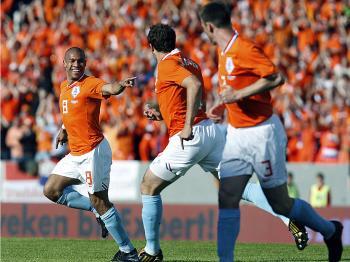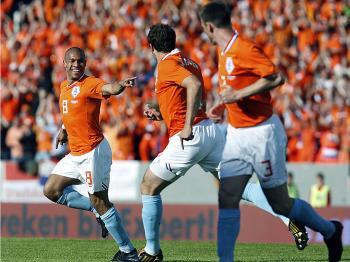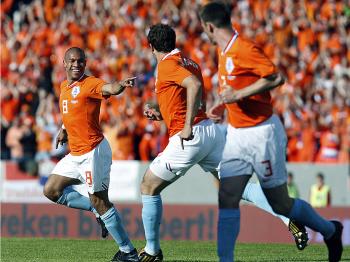WOERDEN, Netherlands—Orange fever is on the rise in the Netherlands in the build-up to the World Cup soccer tournament in South Africa. The Dutch team began a secluded training camp on Monday after coach Bert van Marwijk announced a preliminary training roster of 30 players.
Lines of journalists and children were waiting for hours to catch a glimpse of the players that arrived one by one in the training complex in Hoenderloo.
The most striking aspect, in the preliminary selection, is the absence of veteran Dutch forward Ruud van Nistelrooij. The 34-year-old forward has had a successful career as striker for PSV Eindhoven, Manchester United, Real Madrid, and is currently playing for HSV Hamburg. He played 64 international matches for the Netherlands, in which he scored 33 goals.
“The way I see it is that even though Ruud is fit now, he had too little time to get back to his required, old level after his lengthy knee injury,” van Marwijk said.
Before June 1, seven more names will be crossed off the roster leaving a definite selection of 23 players going to South Africa.
In potential, the Dutch team is a serious candidate for the title with arguably one of the world’s most spectacular attacking lineups. World class players feature such as Arsenal’s Robin van Persie, Bayern Munich’s Arjen Robben, and a creative midfield with Inter Milan’s Wesley Sneijder and Real Madrid’s Rafael van der Vaart. The Dutch rank fourth in the FIFA World rankings.
The Dutch made it to the finals of the World Cup in 1974 and 1978, in which they were beaten by Germany and Argentina respectively. They played soccer defining a style called “total football.”
“Total football and its attacking pressure are truly spectacular. It places great demands on individual and team tactical excellence. An absolute prerequisite, to master such a team tactical aspect, is that all the players possess a positive mentality, including the substitutes,” said former Dutch coach Rinus Michels to www.bettersoccermorefun.com. Michels won the European Championship with Netherlands in 1988.
At times when some of these requirements were missing, it led to underachievement and often the Dutch failed in big games, despite obviously being the superior team. This, of course, caused national soccer traumas in the Netherlands.
In April, Nol de Ruiter who was the assistant coach during the World Cup in Italy in 1990, published a diary with a few chapters narrating his tournament experience.
Lines of journalists and children were waiting for hours to catch a glimpse of the players that arrived one by one in the training complex in Hoenderloo.
The most striking aspect, in the preliminary selection, is the absence of veteran Dutch forward Ruud van Nistelrooij. The 34-year-old forward has had a successful career as striker for PSV Eindhoven, Manchester United, Real Madrid, and is currently playing for HSV Hamburg. He played 64 international matches for the Netherlands, in which he scored 33 goals.
“The way I see it is that even though Ruud is fit now, he had too little time to get back to his required, old level after his lengthy knee injury,” van Marwijk said.
Before June 1, seven more names will be crossed off the roster leaving a definite selection of 23 players going to South Africa.
In potential, the Dutch team is a serious candidate for the title with arguably one of the world’s most spectacular attacking lineups. World class players feature such as Arsenal’s Robin van Persie, Bayern Munich’s Arjen Robben, and a creative midfield with Inter Milan’s Wesley Sneijder and Real Madrid’s Rafael van der Vaart. The Dutch rank fourth in the FIFA World rankings.
The Dutch made it to the finals of the World Cup in 1974 and 1978, in which they were beaten by Germany and Argentina respectively. They played soccer defining a style called “total football.”
“Total football and its attacking pressure are truly spectacular. It places great demands on individual and team tactical excellence. An absolute prerequisite, to master such a team tactical aspect, is that all the players possess a positive mentality, including the substitutes,” said former Dutch coach Rinus Michels to www.bettersoccermorefun.com. Michels won the European Championship with Netherlands in 1988.
At times when some of these requirements were missing, it led to underachievement and often the Dutch failed in big games, despite obviously being the superior team. This, of course, caused national soccer traumas in the Netherlands.
In April, Nol de Ruiter who was the assistant coach during the World Cup in Italy in 1990, published a diary with a few chapters narrating his tournament experience.





